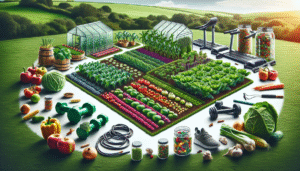Unleashing Your Potential: The Non-GMO Approach to Vitality
Unleashing Your Potential: The Non-GMO Approach to Vitality
In an age where health-conscious living is gaining precedence, understanding the profound connection between diet, genetics, and overall vitality is essential. The concept of Non-GMO (genetically modified organisms) food has become pivotal in promoting a lifestyle that encourages individuals to unlock their full potential. By choosing non-GMO options, one places focus on natural, wholesome ingredients that can significantly improve overall health.
1. Understanding Non-GMO Foods
1.1 What Are Non-GMO Foods?
Non-GMO foods are those that have not been genetically altered through biotechnology. The Non-GMO Project, an independent non-profit organization, verifies products that meet its rigorous standards, allowing consumers to identify and choose foods made without genetically modified ingredients.
1.2 The Importance of Non-GMO in Diet
The scientific community is divided on the long-term effects of consuming genetically modified foods. However, concerns about pesticide residues, potential allergens, and environmental impacts make a strong case for opting for non-GMO choices.
2. The Biological Impact of Non-GMO Foods
2.1 Nutritional Benefits
Research suggests that non-GMO crops may possess higher nutritional value. They often contain higher levels of antioxidants, vitamins, and minerals. For instance, studies have indicated that organic non-GMO fruits and vegetables often exhibit higher levels of vitamin C and polyphenols.
2.2 Gut Health and Microbiome
Non-GMO foods tend to contain fewer artificial additives and preservatives. Regular consumption of natural foods can foster a healthy gut microbiome—crucial for maximizing nutrient absorption and maintaining a balanced immune response.
2.3 Reduced Toxic Exposure
By selecting non-GMO products, consumers often minimize exposure to harmful pesticides. Residue studies have shown that non-GMO crops are statistically less likely to contain significant levels of harmful chemicals, which can contribute to various health complications over time.
3. Mental Health and Wellness
3.1 Impact on Mood and Energy Levels
There is a notable connection between diet and mental health. Non-GMO foods can contribute to improved energy levels and mood stability. Nutrient-dense foods rich in omega-3 fatty acids, found in non-GMO walnuts and flaxseeds, support brain health and emotional well-being.
3.2 Cognitive Function
Consuming a diet rich in whole, non-GMO foods can enhance cognitive function. Foods high in antioxidants—such as berries—reduce oxidative stress on the brain, potentially delaying neurodegenerative diseases and cognitive decline.
4. Building a Non-GMO Diet
4.1 Reading Labels
Begin by educating yourself on reading food labels diligently. Look for products with the Non-GMO Project Verified seal. Familiarize yourself with common genetically modified foods—such as corn, soy, and canola—to make informed choices.
4.2 Whole Foods Emphasis
Prioritize whole foods over processed options. Fresh fruits, vegetables, whole grains, nuts, and seeds provide an abundance of nutrients essential for bodily functions and energy.
4.3 Seasonal and Local Eating
Support local farmers and promote sustainability by opting for seasonal produce. Local non-GMO options often boast higher freshness and superior taste, while supporting local economies reduces carbon footprints linked to transportation.
5. Complementing a Non-GMO Diet with Lifestyle Changes
5.1 Physical Activity
Regular exercise complements a healthy non-GMO diet. Engaging in at least 150 minutes of moderate aerobic exercise weekly can enhance physical vitality, making it easier to harness the energy derived from nutrient-rich non-GMO foods.
5.2 Mindfulness and Stress Management
Building a non-GMO lifestyle can significantly reduce stress. Mindfulness practices—such as meditation, yoga, and deep breathing—can enhance overall well-being and make it easier to stick to healthy habits.
5.3 Proper Hydration
Water is essential for life, aiding digestion and nutrient absorption. Staying well-hydrated supports the body’s physiological processes, ensuring that the nutrition from non-GMO foods is effectively utilized.
6. Gardening and Homegrown Potential
6.1 Start Your Own Non-GMO Garden
Home gardening not only ensures a stock of fresh, non-GMO produce but also allows one to connect with food sources. Growing organic vegetables such as heirloom tomatoes or leafy greens provides a sense of accomplishment while offering the freshest ingredients.
6.2 Community Gardens
Engaging in community gardening initiatives can provide access to non-GMO produce. Besides benefiting physical health, such activities foster social connections and community spirit, contributing to overall happiness.
7. The Environmental Edge of Non-GMO Choices
7.1 Biodiversity
Non-GMO farming practices emphasize ecological sustainability and biodiversity. By supporting these methods, consumers contribute to preserving local ecosystems and decreasing the reliance on monocultures that characterize much of modern agriculture.
7.2 Reducing Carbon Footprint
Opting for non-GMO foods can encourage sustainable agricultural practices. By choosing products with environmentally friendly certifications, individuals can play a role in reducing the carbon footprint associated with industrial-scale farming.
8. The Economic Perspective of Non-GMO Foods
8.1 Supporting Local Economies
Purchasing non-GMO products, particularly from local farms, strengthens local economies. It keeps monetary resources within communities, bolstering agricultural sustainability.
8.2 The Future of Agricultural Practices
As consumer demand continues to shift toward non-GMO options, farmers are incentivized to adopt more sustainable practices, ultimately reshaping the agricultural landscape in favor of environmentally friendly methods.
9. Proactive Steps to Embrace a Non-GMO Lifestyle
9.1 Community Education
Engaging in community discussions about the importance of non-GMO foods can help educate others. Workshops, cooking classes, or information sessions can promote awareness of the benefits of these dietary choices.
9.2 Advocacy for Change
Support policies and programs that encourage non-GMO agricultural practices. Writing to local representatives or participating in advocacy organizations can help influence larger-scale changes in food systems.
9.3 Continuous Learning
Staying informed about the latest research and developments in the non-GMO sector is crucial. Subscribing to reputable health and nutrition journals or following credible online platforms can aid in making informed dietary choices.
10. The Journey Towards Unleashed Potential
10.1 Personal Accountability
Acknowledging the link between diet, lifestyle, and health is vital in the journey toward unleashing your potential. Commit to mindful eating and lifestyle choices that are aligned with a non-GMO ethos.
10.2 Setting Goals
Setting realistic and attainable health goals can encourage change that leads to vitality. Track progress, celebrate milestones and adjust goals as needed to facilitate ongoing improvement.
10.3 Embracing the Process
Cultivating a non-GMO lifestyle is a journey, not a destination. Embrace the small changes and developments within your lifestyle that progressively contribute to a greater sense of wellness.
Final Note
Incorporating non-GMO foods and lifestyle adjustments presents a comprehensive approach to enhancing vitality. By nurturing the body through mindful dietary choices and sustaining wellness through physical activity and mental clarity, individuals can ultimately unleash their potential to thrive. The choice of a non-GMO lifestyle goes beyond personal health; it supports communities, sustains ecosystems, and actively contributes to a more robust and vibrant future for all.








